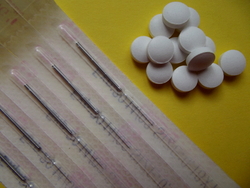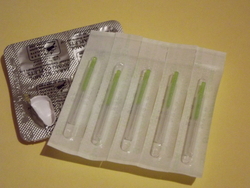A study published by the British Medical Journal shows that acupuncture outperforms counselling and usual care, in patients who have depression complicated by pain. This follows from a secondary analysis of the study data arising out of the research detailed on 21 January 2014 below.
A total of 755 patients recruited through GP practices across northern England, were randomised to receive acupuncture (302 patients), counselling (302 patients) or usual care alone (151 patients). Patients’ assessment of their pain and general wellbeing revealed that those with moderate to extreme pain were doing better after three months if they received acupuncture compared with those who received either counselling or usual care.
(Acupuncture, counselling or usual care for depression and comorbid pain: secondary analysis of a randomised controlled trial. BMJ Open, May 2014.)

 A large UK multi-centre, randomised controlled trial has shown that adding either acupuncture or counselling to usual care, can hasten improvements in patients with moderate to severe depression. A total of 755 such patients were recruited from 27 GP practices across northern England, and randomised to one of three groups: acupuncture (302 patients), counselling (302 patients), or usual care alone (151 patients). Over a three month period, patients attended a mean of ten acupuncture sessions or nine counselling sessions. Patients were followed up over twelve months. Usual care, including antidepressants, was available to all three groups.
A large UK multi-centre, randomised controlled trial has shown that adding either acupuncture or counselling to usual care, can hasten improvements in patients with moderate to severe depression. A total of 755 such patients were recruited from 27 GP practices across northern England, and randomised to one of three groups: acupuncture (302 patients), counselling (302 patients), or usual care alone (151 patients). Over a three month period, patients attended a mean of ten acupuncture sessions or nine counselling sessions. Patients were followed up over twelve months. Usual care, including antidepressants, was available to all three groups.  Researchers in Toronto, Canada have found in a pilot study, that acupuncture has a potential role in helping with the unwanted sexual side-effects of antidepressant medication. These drugs, including the so-called SSRIs introduced in more recent years (citalopram, cipramil, fluoxetine, Prozac, Seroxat) are known to cause sexual dysfunction such as loss of libido and impotence in 50 to 90% of users.
Researchers in Toronto, Canada have found in a pilot study, that acupuncture has a potential role in helping with the unwanted sexual side-effects of antidepressant medication. These drugs, including the so-called SSRIs introduced in more recent years (citalopram, cipramil, fluoxetine, Prozac, Seroxat) are known to cause sexual dysfunction such as loss of libido and impotence in 50 to 90% of users. 
